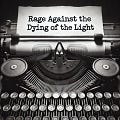Raging Against the Dying of the Light
Dylan Thomas and Finding Light To Rage Against In the Oncologist's Office
It is Wednesday, August 21st, 2024. I am in an oncologist’s office surrounded by people in comfortable recliners. Nurses are attending to a half-dozen patients who are all receiving chemotherapy. My father is here, sitting beside me under a blanket, beginning his treatment.
“To rage against the dying of the light,” Dylan Thomas wrote— is a phrase so pregnant with anger, grief, and defiance that it threatens to consume the page on which it is written. However, here we are, in the 21st century, still confronting the same dying light, still trying to rage and make sense of what it means to resist the inevitable.
Our world is not the one Thomas knew, and yet it is. The light dies in new ways, perhaps more insidiously than in his day. There is the light of truth, snuffed out by the shadows of misinformation; the light of hope, dimmed by the relentless march of ecological catastrophe; the light of connection, flickering as we retreat into the pixelated glow of our devices, alone together in our separate silos. And then there is the most personal light—the one that dims as we age, as the relentless tick of the clock reminds us of our mortality. To rage against this dying light is to resist death and the profound disillusion characterizing life in the 21st century.
What does it mean to rage? For Thomas, rage was visceral, a fight against the encroaching darkness. We find ourselves unable to summon the same kind of defiance. When it comes, our rage is diffuse, scattered across a thousand different grievances. We rage against politicians, war, inflation, climate change, and, as I am doing this morning - cancer. But rarely do we rage with the singular focus that Thomas called for, the kind that makes the dying light seem less like an inevitability and more like a challenge to be met.
Today, the dying of the light feels different. It is no longer just the fading of the day into night, the transition from life to death. It is the slow erosion of the ideas, institutions, and realities we thought would last. It is the creeping sense that the world is moving on without us, that the things we once believed in are slipping away, and that we can do nothing to stop it. To rage against this dying light, then, is to insist that we still have agency, that we can still make a difference, and that our voices still matter, even as they are drowned out by the noise of a thousand competing narratives.
What does it mean to rage in the age of irony when even our sincerity is suspect? How do we channel our anger, fear, and despair when caring deeply is met with skepticism? Thomas’s rage was pure, unfiltered, a raw expression of the human will to survive. In the 21st century, we question our emotions, wondering if they are real or just a product of the media we consume and the hidden algorithms that shape our thoughts. To rage, then, is to assert the authenticity of our own experience, to declare that we feel deeply that we are alive, even as the world around us seems increasingly detached, automated, and artificial.
This is the greatest challenge we face in the 21st century: believing in the power of our rage. To think that it is not futile, that it is not simply a cry into the void, but a force that can change the world, or at least change us. To rage against the dying of the light is to refuse to go quietly into that good night, to demand more from life, even as it slips away from us. It is to assert our humanity in a world that seems determined to deny it.
And so, we rage. Not because we believe we can stop the dying of the light—because we cannot. But because, in the act of raging, we affirm our existence and significance. We rage because, in the end, it is all we have left. And perhaps that is enough.
Our rage is more than an act of defiance—it is an act of love. It is a testament to the things that matter and are worth fighting for, even as they disappear into the darkness. To rage against the dying of the light is to hold onto those things, to cherish them, and to refuse to let them go quietly. And in that refusal, we find our purpose, meaning, and reason to go on.




I was deeply moved by your essay, "Raging Against the Dying of the Light." Your reflection on modern challenges and the nature of our rage hit home. The way you connect Dylan Thomas’s words to today’s struggles is compelling. Thank you for such a poignant and thought-provoking piece.
Yes I agree! We must live in the face of death. Thanks for this reminder.